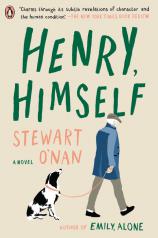Henry, Himself
Review
Henry, Himself
When it comes to writers working today, none may be better than Stewart O'Nan at portraying the intimate details of simple daily life. His new novel, HENRY, HIMSELF, is yet further evidence of that estimable talent. In this prequel to WISH YOU WERE HERE and EMILY, ALONE, O'Nan applies it on a return visit to the Maxwell family of Pittsburgh, seen this time through the eyes of its patriarch. It's a tender story of a year in old age of a member of the Greatest Generation, a reflection on what it means to live a thoroughly decent, if unexceptional, life.
O'Nan has chosen to set the novel in 1998, amid the investigation that led to Bill Clinton's impeachment and the heady days of the Internet boom. FOX News and MSNBC were mere toddlers then, but it's hard to picture 74-year-old retired aerospace engineer Henry Maxwell as an avid consumer of either network's flavor of opinion. A man of orderly habits and a vestryman at his Episcopal church, he's lived all his life in the same neighborhood, one that's still comfortable but that seems to have slipped at least a rung down the economic ladder. He's a fan of the Steelers and Pirates, a temperate drinker of Iron City beer and single malt scotch, and a kindhearted master to his dog Rufus, who's a prominent presence in the novel.
Though he's no Rabbit Angstrom or Frank Bascombe, Henry's inner life provides plenty of fertile territory for O'Nan to explore. For one thing, Henry's outward stoicism and his emotional instincts often appear to be at odds. That conflict emerges most clearly in his attitude toward Margaret, one of the Maxwells' two children, who's engaged in a battle with alcoholism in which she's intermittently successful at best.
"Among the many pleasures of HENRY, HIMSELF is its portrait of Henry's union with his wife Emily, celebrating the 'mystery at the heart of any marriage, secrets even people close to it would never know,' as they approach their 50th anniversary."
While Henry, unlike Emily, has chosen to retreat from the battlefield, he's hardly untroubled by his decision: "Just as often he doubted his own position, accusing himself of coldness, cowardice. What kind of father had so little faith in his daughter?" Henry is the kind of man who awkwardly pushes aside overt displays of sentiment, yet he is quietly grateful for family gatherings at Thanksgiving and Christmas or the Valentine's Day dinner he celebrates with Emily.
Beyond some of the normal harbingers of the apocalypse in the eighth decade --- high cholesterol, aching knees, the occasional memory lapse and a page-long list of medications O'Nan details before concluding, "Most of the time he felt fine” --- Henry seems relatively unburdened by the specter of encroaching age, even as he knows the end isn't likely to be more than a few years off. As he blows out the two candles on his 75th birthday cake, he simply "closed his eyes and wished for another."
Among the many pleasures of HENRY, HIMSELF is its portrait of Henry's union with his wife Emily, celebrating the "mystery at the heart of any marriage, secrets even people close to it would never know," as they approach their 50th anniversary. O'Nan perfectly captures its essence, from the division of labor, express and implied, that marks long-term marriages, to the tender jibes and private language shared by husband and wife. Unlike the marriage in crisis O'Nan described in THE ODDS, theirs is a companionable match, apparently lacking much in the way of physical intimacy, but with a strong emotional attachment. "You're lucky that I love you," she chides him in one of their exchanges. "I know," he replies.
But at heart, Henry is a man who likes to fix things, taking great pride in executing his handyman duties. His ambivalent encounter with an infestation of mice or his fight with the "forces of chaos" that emerge from an overflowing basement drain, are, if not the stuff of high drama, as O'Nan portrays them, a window into his protagonist's character. So, too, are the family rituals at a cottage on Chautauqua Lake, where the Maxwells have spent their summers for several generations. An evening of mini-golf or a day of chores are reminders that these small moments are the bricks in any family's house of memory.
Henry doesn't dwell on the events of his combat experience in France, beyond brief recollections of lost comrades or the memory of feasting on a frozen horse and other cruelties of war. And while there's nothing in the novel to suggest that he was any sort of hero, as O'Nan portrays him, he's the kind of man who wouldn't make much of that heroism if he had been.
At the funeral of his physician, a college classmate, Henry assesses his own life: "He was hardworking. He was reliable, and honest, and good with his hands. That was the best he could hope for, he supposed." In this gentle, graceful novel, Stewart O'Nan shows just how far short of the truth such a reductive summing up can be.
Reviewed by Harvey Freedenberg on April 19, 2019
Henry, Himself
- Publication Date: April 7, 2020
- Genres: Fiction
- Paperback: 384 pages
- Publisher: Penguin Books
- ISBN-10: 073522305X
- ISBN-13: 9780735223059




